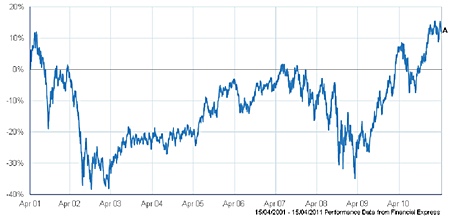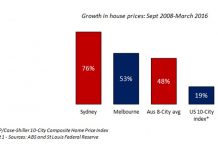Lex Luthor spoke these words in Superman II. However, he was aiming for somewhere more northern that I am. Nonetheless, he did want to find somewhere he could secure his future and make him rich. Whilst I can promise neither of these, it may be worth having a quick look at the country north of America that many people seem to forget – Canada.
Many Americans are either too loyal to Uncle Sam, too mistrusting of anything non-US or just too myopic to realize there is actually a world outside of its own boundaries – I still find it amazing that only 37% of Americans have passports (http://www.travel.state.gov). However, even these people may not realize they are actually investing overseas as they may own international shares via a global mutual fund or may be putting money into an American company which has access to foreign markets. A perfect example is someone like Ford or General Motors.

However, now may be a time to tip the toes somewhere else and if Americans do not want to risk anything over the water or in a country which does not speak the same language then Canada may be the option – yes, I know an unfortunate few speak French but it is not their fault! Let’s face it, even Warren Buffet is looking abroad these days and if it is good enough for the Sage of Omaha then it should be okay for the rest of us mere mortals.
Let’s face it, the S&P500 has only returned just over 11% in the last decade and this is, in reality, only due to the incredible growth between April 2009 and April 2010 (see graph).
More importantly, diversification away from anything to do with the US Dollar is vital. As many people know, I am a great believer in not being greedy but always trying to beat the bank. Never before has this been so true. By looking at the multi-manager, multi-asset strategy you should be able to achieve this goal. Personally, I would advocate placing money all over the place – both sectorally and geo-politically. The more fingers you have in as many pies as possible the better.
Despite this, I do understand people’s reticence at investing in places they do not understand and have the potential to be a lot more volatile than areas closer to home. Canada would seem to be a good solution as it has a different currency, favours wealth preservation and has an economy that is not shot to pieces. I know it is about to have an election but at least they do not have generals appearing in the national media denying the possibility of a military coup – not yet anyway.
As David Rosenberg, the Chief Economist and Strategist at Canada’s Gluskin Sheff & Associates states, “In my three decades in the forecasting business, I don’t remember a time when the upside potential and downside risk to investing in Canada vis-à-vis the USA – from an economic, financial and political standpoint – was as compelling as it is today.”
There are many reasons for this statement but Rosenberg points to a few salient facts to support his argument:
* Canada is a net oil exporter; the US is the world’s largest oil importer.
* Canadian employment growth is booming; US employment growth is moribund.
* Canadian government finances are fairly solid; US government finances are spiraling out of control.
* Canadian inflation is tame; US inflation is resurgent.
Americans are not the only people looking to invest in Canada, foreign investment is as well. Last year, almost CAD120 billion came in from abroad and, in January alone, over CAD13 billion was invested from overseas.
Rosenberg continues, “The Canadian economy remained very strong in the opening months of 2011. It looks like the Canadian economy could outperform the US economy for the second quarter in a row… Canadian manufacturing shipments jumped 4.5% month-over-month in January, the best monthly showing in over a year and a half… Wholesale sales were also very strong, jumping 1.6% month-over-month on an inflation- adjusted basis… On top of this, the economy has created 84,000 jobs in total in January and February (adjusted for population, this would be equivalent to about 800,000 US jobs!).”
Rosenberg goes on, “The latest (American) Job Opening and Labor Turnover Survey (JOLTS) data for January showed that US job openings dropped 161,000 … and now stand at their lowest level since July 2009 when the economy was barely emerging from the worst recession since the 1930s. New hires also fell 193,000 and are now down in six of the past seven months – the lowest they have been since October 2009.”
So, big plusses for the economy and employment. What about the currency? Rosenberg again, “Canada stands out as being one of the few countries that is not only rated AAA by the major credit agencies but actually does have a AAA balance sheet. [Accordingly], the Canadian dollar … has emerged as a safe-haven currency – like the Swiss franc but with a decent positive yield and exposure to raw materials… The Canadian dollar experienced no fewer than five intermittent pullbacks last year and yet still finished 2010 with a 5 1/2% gain, not just against the USD, but versus a basket of non-dollar currencies too… The added fact that the Loonie has so vastly outperformed its commodity counterparts such as the Aussie and the Kiwi attests to the view that the Canadian dollar story transcends the prices of crude, corn and copper.”
Not everything is peachy though. There is a potential problem with the property sector. Whilst other Developed Markets (DM) have had massive corrections in the real estate world Canada has not yet been affected.
If there has to be an adjustment to the present situation then it could have severe consequences for the national economy. Consumers will cut back and there will be no further property investment.
There is an argument against this though and that is the present state of things should allow for a ‘soft’ landing at worst. The banks are in a much better situation than elsewhere in the DM, interest rates are low, there are so many natural resources they do not know what to do with them and the mortgage market is much more attuned to the real world than their counterparts south of the border were in the ‘Naughties’. Also, the housing boom is due to demand and not greedy speculation.
Nevertheless, it cannot be denied that house prices are excessive when taken into account against actual earned income and family debt is on the rise. Economic historians point to other disturbing evidence. In 2009, residential housing investment – as a percentage of GDP – was at 6.48%. This is down from its peak of over seven percent in 2007. The previous peaks were in 1976 and 1989. Soon after these dates the housing market in Canada dived. Without doubt the ration of housing investment to GDP has been a good pointer to the real estate market corrections before and it may be again.
However, what these historians may not be taking into account is that any government and business community worth its salt should be following the wise words of President Harry Truman, “The only thing new in this world is the history that you don’t know.” By learning from the recent mistakes south of the border and elsewhere there is no reason why Canada should descend into the chaos that has happened in other parts of the globe.
There is a lot to be said for Canada. Investing there may not produce the best potential returns but the volatility will be a lot better, things are much more transparent and you will have begun to diversify. However, above all, remain liquid.
The above data and research was compiled from sources believed to be reliable. However, neither MBMG International Ltd nor its officers can accept any liability for any errors or omissions in the above article nor bear any responsibility for any losses achieved as a result of any actions taken or not taken as a consequence of reading the above article. For more information please contact Graham Macdonald on [email protected]




